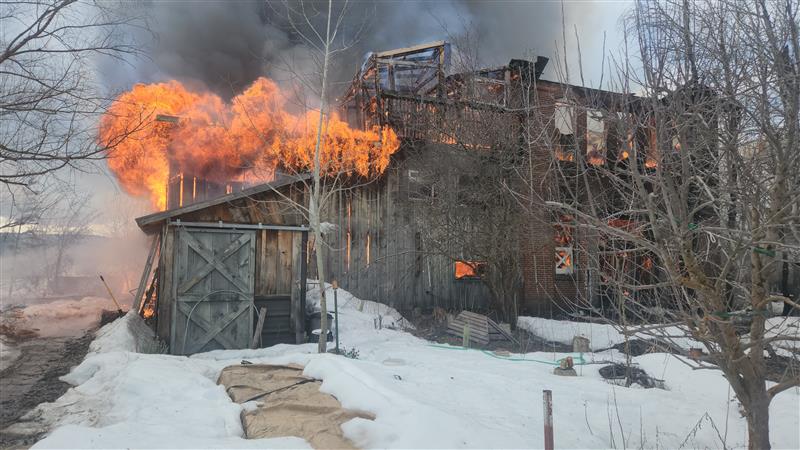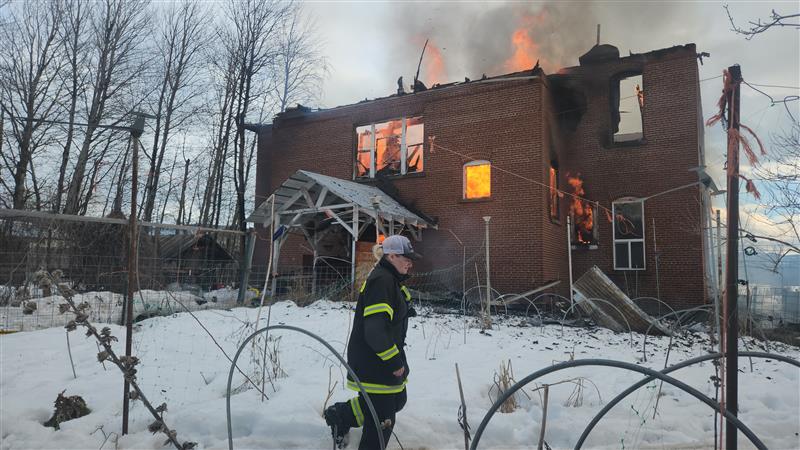Category: Fire Service Training
Fire academy training proves vital in real-world emergency response


New Meadows, Idaho — On March 24, Fire Service Training (FST) Program Director Brad Terry found himself in the right place at the right time while driving back from the Clearwater Fire Academy in Orofino. As he passed through New Meadows, he noticed smoke rising from the valley and quickly turned around after seeing a Meadows volunteer fire truck heading in the opposite direction.
“As I got closer, I could tell this was a bigger fire, likely a structure fire,” said Terry.
By the time he arrived, the two-story brick building was fully engulfed, with the roof collapsing. Terry offered assistance, helping set up water supply lines for the local responders and learned that two of the firefighters battling the blaze had just completed their training at the Clearwater Fire Academy that weekend. One of the volunteer firefighters had taken the Fire Essentials course days earlier.
“He looked at me and said, ‘Hey, weren’t you at Clearwater?’” said Terry. “I said, ‘Yeah, you were too!’ It was amazing to see someone apply what they had just learned in such a real, immediate way.”
“It’s incredible to see how the training is paying off right away,” said Terry. “These volunteers are really committed to their communities, and this training gives them the skills to respond when they’re needed most.”
Brad Terry
Terry also met a Fish and Game officer volunteering with the Meadows Valley Fire Department who had taken the same course.
“It’s incredible to see how the training is paying off right away,” said Terry. “These volunteers are really committed to their communities, and this training gives them the skills to respond when they’re needed most.”
FST offers courses ranging from basic fire essentials to advanced certifications in areas like hazardous materials and rescue operations. After completing training, firefighters can take exams to become certified in specific firefighting skills. These certifications help ensure that both volunteer and professional firefighters are prepared for emergencies.
The Clearwater Fire Academy is one of several FST events held each year, drawing hundreds of participants to gain certifications or renew existing ones. This past weekend’s academy saw 230 attendees who received hands-on training in fire suppression, rescue operations, and hazardous materials management.
“Training isn’t mandatory in Idaho, but it’s strongly recommended,” said Terry. “Having certified firefighters on the frontlines means a more effective response and can even lower insurance ratings for the community.”
The true value of the training was evident during the New Meadows fire.
“In this job, you never know when you’ll be tested,” said Terry. “Seeing these firefighters apply their skills from Clearwater to this fire shows just how important this training is.”
Brad Terry named permanent program director for Idaho Fire Service Training

Brad Terry has been appointed permanent Program Director for Idaho’s Fire Service Training (FST), effective April 1.
Idaho Fire Service Training, housed within the Idaho Division of Career Technical Education (IDCTE), plays a crucial role in Idaho’s fire service community. As an accredited entity through the International Fire Service Accreditation Congress, Idaho FST offers access to industry credentialing, maintains transcripts, and provides training.
Terry brings extensive experience to his new role, including four years in the Marines and 17 years in the Air Force, including two deployments to Iraq and Afghanistan. Terry also served more than 26 years with the Nampa Fire Department. He progressed through various positions within the department, including firefighter, engineer, captain, shift training officer, and battalion chief, finally retiring in 2021.
“Since August, Brad has been serving in an interim role leading the work of Idaho’s Fire Service Training,” said Clay Long, IDCTE’s state administrator. “I’m excited to have Brad take the helm in the permanent role to continue building and moving FST forward.”
Terry is honored to serve in this new capacity.
“It’s a privilege to continue serving the firefighting community and contributing to the invaluable work of Idaho FST,” said Terry.
Veteran Firefighter Appointed to Lead Idaho Fire Service Training


Karine Johnson has been appointed as program director of Fire Service Training (FST), effective April 18, 2022. Johnson has more than 20 years of experience in fire service in positions including firefighter, deputy state fire marshal, and deputy fire chief. In addition, she served as program manager for FST when it was previously housed at the Idaho Division of Career Technical Education (IDCTE) and has spent many years working as an instructor and evaluator.
Johnson holds an associate degree in engineering technology from Oregon Polytechnic Institute, an associate degree in fire service technology from Boise State University, and a dual-emphasis bachelor’s degree in fire service technology and communication and management from Boise State University. In addition, Johnson is a certified fire investigator. Johnson has been helping to transfer International Fire Service Accreditation Congress (IFSAC) accreditation from the College of Eastern Idaho, where the program was previously housed, and ensure the continuation of services since mid-December.
“Her multi-faceted experience in all aspects of the fire service, including training and certification in both career and volunteer capacities, means she understands the needs and demands of the fire community,” said Clay Long, state administrator for IDCTE. “Karine has also taken the initiative to improve the certificate and certification issuing process.”
Her multi-faceted experience in all aspects of the fire service, including training and certification in both career and volunteer capacities, means she understands the needs and demands of the fire community
–Clay Long
Jerry Holenbeck, FST advisory council chairman and fire operations division chief with the Idaho National Laboratory, echoes Long’s sentiments on Johnson’s appointment.
“Karine has a passion for the fire service. I know she’ll listen to the fire chiefs and work with us to improve and simplify processes,” said Holenbeck. “Ultimately, this collaboration will mean we’re better able to turn out trained, qualified firefighters to protect and serve our communities.”
Fire service training administration to be moved to Idaho Division of Career Technical Education
During the State Board of Education’s Aug. 26, board meeting, Idaho Division of Career Technical Education (IDCTE) State Administrator Clay Long announced that they intend to transfer Fire Service Training (FST) from the College of Eastern Idaho (CEI) to IDCTE in July 2021.
FST provides fire training credentialing for career and volunteer firefighters in Idaho. Credentialing is the certification process for firefighters after they have completed an approved fire service training course. Many municipal fire departments require firefighter credentialing to even test for a position.
CEI had administered FST since 2014 when the FST program was transferred to the technical college system to gain efficiencies. During that time, CEI secured more than $1 million in federal grant funding to purchase state-of-the-art fire training equipment to support ongoing skills development for more than 180 Idaho fire departments.
The proposed change will ensure Idaho’s FST provides a statewide system that allows institutions to meet the needs of their region and industry. FST will use IDCTE’s existing SkillStack® system for student record management, and institutions will have the flexibility to deliver needed training to their region. FST will continue to provide training and services for regions without fire training programs at their technical colleges.
“Over the years, CEI has made significant progress in administering FST. I am excited to build on that success and leverage IDCTE’s existing statewide framework to ensure access to training and certification for all individuals who serve in the fire service in Idaho,” said Long.
“The Idaho Fire Chief’s Association is excited about collaborating with IDCTE. We feel this is the best move to ensure career and volunteer firefighters in Idaho are safe, educated, and able to respond to emergencies,” said Myklebust.
Myklebust added that collaboration with IDCTE would foster relationships with regional colleges to provide education and keep students in Idaho to serve their local fire departments.
The decision also has the support of CEI.
“We look forward to working with IDCTE to transition this important training program back to the state to provide further efficiencies and access by both professional firefighters and students,” said Michelle Holt, executive director of the Workforce Training and Continuing Education Center at CEI. The decision was made after several months of conversations with a variety of stakeholders, including CEI, the College of Southern Idaho, the Technical College Leadership Council, the Idaho Fire Chiefs Association, and the State Board of Education. In the coming months, IDCTE will work closely with these stakeholders to ensure a smooth transition and minimal disruptions. A copy of the memo announcing the change was sent to stakeholders.
 Official Government Website
Official Government Website